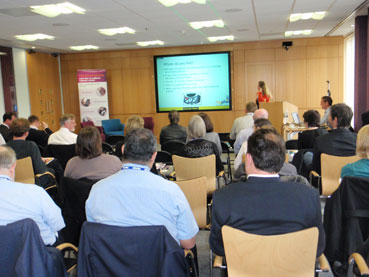|
MORE DETAILS
|
LUNCHTIME BRIEFING - 30 APRIL 2009 - LONDON
|
Emma D'Arcy, Leader of Strategic Insights at myPHID led a timely discussion about the new era of engagement in relationships between the pharmaceutical industry and the medical community. Emma provided insights from the research initiatives that myPHID is running and commented on the 'Health 2.0' technologies that will see all MedComms agencies including podcasts, blogging and social networking as part of the communication strategies they advise to clients.
Neil Jones, Director of Branded Solutions at Medical Marketing Research International (MMRI) provided an excellent overview of the role of his product, COMM-NET as an incisive aid to KOL mapping and publication planning.
[Click here for Neil's slides - PDF file, 1.8MB.]
A summary of the meeting is published here below


Overview written by Barbara Byth, Axon Communications
Emma D'Arcy, Leader of Strategic Insights at myPHID, spoke about current issues in pharma industry – physician relationships.
Puritanical prohibition
Despite the pharmacy industry being one of the most highly regulated industries, a small but vocal minority agitate against contact between physicians and industry. Industry involvement is perceived as working against the best interests of patients and leading to increases in healthcare costs. The room was divided as to whether this is a purely ‘anglo-saxon’ phenomenon – some participants reported that they had not experienced these problems with KOLs from European countries.
Tarnished by industry
Industry engagement is not seen as positive by physicians, whereas it used to be an ‘esteem indicator’ (and still is in some countries).
There was some debate among participants about whether CME is the solution to this perception or whether it created the problem in the first place.
What is a ‘KOL’
The role of the ‘key opinion leader’ is changing. Medical publications are being challenged as the main source of information for physicians and patients, reducing the influence of authors. With the rise of social media, information is both widely available and less controlled: more of a conversation rather than a one-way flow of opinion.
Some companies are moving towards engaging with ‘external experts’, recognising that a wide range of skills and experience can be brought to the table.
Ignorance breeds contempt
Physicians increasingly do not know how to interact with industry, with little information provided as part of medical school training. There are a number of different guidelines, including European, national and society guidelines. Physicians may have low awareness of these and tend to rely on industry and medical education agencies to ensure adherence.
Mediated not motivated
Media outlets tend to be dominated by anti-pharma voices, with blogs and social media allowing greater individual influence. Negative press is mostly conjecture and opinion. Even rational voices in favour of engagement can be misquoted.
Emma provided a preview of results from a recent ABPI survey of 2000 members of the public. Results show people are less concerned about physician-industry interactions and see pharma as innovators committed to developing new medicines and ‘saving lives’. Among other findings, the respondents reported that they trusted their doctor the most for health information, followed by the pharma industry and with the media least trusted.
Time for a new era of engagement
Having established the scope of the current problem, Emma then discussed strategies for improving industry – physician relationships in future.
There is a need to re-establish integrity and value of physician industry relationships, with physicians willing to talk about the benefits of their engagement with industry. Physicians need to take some responsibility for exploiting ‘the system’ in the past.
Both parties need to appreciate the value of sharing expertise and acknowledge what industry brings to the table. New relationships should be established that are mutually beneficial.
Industry should be more proactive in responding to unreasonable criticism. Social media provide an opportunity, but industry need to have a strategy and be prepared to relinquish control while remaining flexible to respond quickly to patient opinions and needs.
The recently published RCP report Innovating for health: Patients, physicians, the pharmaceutical industry and the NHS is one attempt to redress the balance.
The myPHID website at www.myphid.com provides a hub for best working practice between healthcare professionals and pharma, with resources including relevant publications and information on ongoing initiatives.
Neil Jones, Director of Branded Solutions at Medical Marketing Research International (MMRI) presented a publication-based research tool (COMM-net) for identifying KOLs and KOL networks. The technology uses data from Medline and Embase to create bespoke data bases that can be interrogated to identify leading authors, institutions and journals, as well as industry activity and collaborations. More information at www.mmr-international.co.uk.
To make sure you're included in announcements about future events just email Peter Llewellyn, if you haven't already done so, to register your interest.
|
|
|

